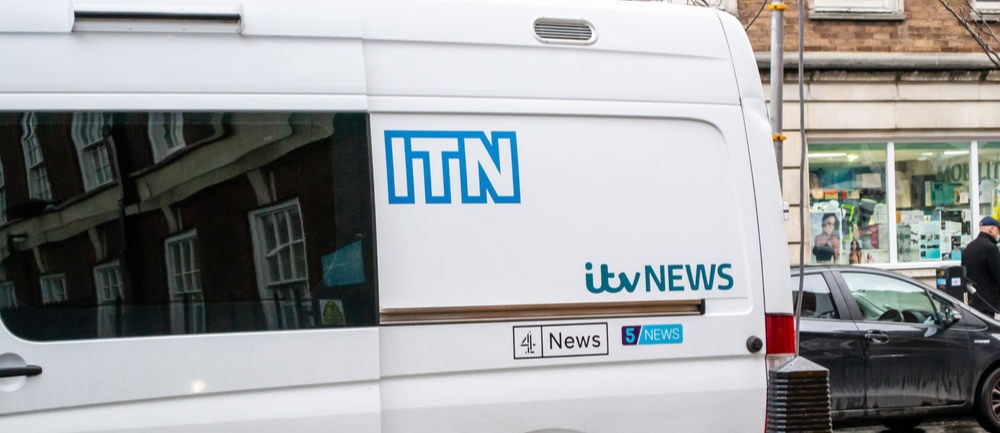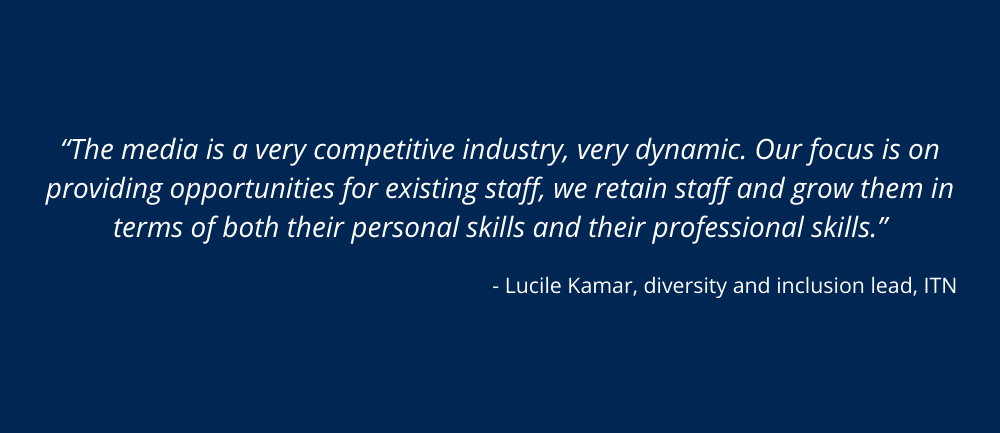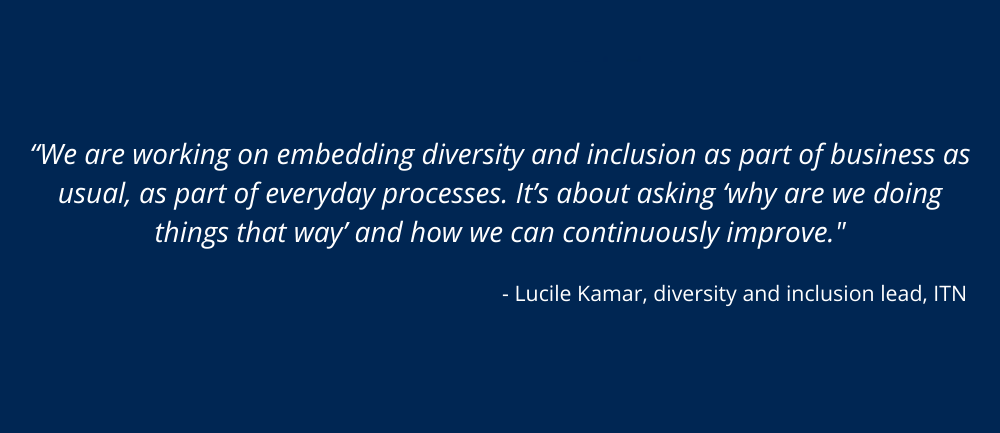-
Provided by

- Date published: Nov 2, 2021
- Categories
Founded in the late 1960s, Independent Television News (ITN) is famous across Britain for its nightly news bulletins which reach an estimated 10 million people. The company’s production arm also generates third-party content for a range of sectors including sports, advertising and education.
In this case study, Lucile Kamar, ITN’s recently appointed diversity and inclusion lead, explains how her team is extending opportunity to all corners of society and changing some tired old assumptions about the media industry in the process.
It’s a cliché as old as the typewriter and the sandwich board: the media, everyone knows, is a bastion of elitism. A world that’s sexy and dynamic but brutal and unforgiving, a world for the quick-witted but not the faint-hearted. Other industries may have moved on, but the media (especially in Britain) remains the preserve of privileged majorities. Or at least, that’s what they say.
But at ITN, one of Britain’s most respected journalistic brands, work is underway to eradicate this tired old trope once and for all. To create a genuinely universal pathway that allows everyone to push for the top, removing bias from the recruiting process and creating a world-class experience for both candidates and existing employees.
“It’s really about changing people’s perceptions about how you succeed, and who’s successful, in the industry,” says Lucile Kamar, ITN’s point-person on diversity and inclusion. “We need to ensure that all our audiences are represented, that differences are not only respected, but celebrated and that we promote genuine social mobility throughout the organisation.”
Lucile herself has only been with ITN a few months. After training in Paris, London and Los Angeles she began her career working for NGOs, striving to end the use of child soldiers. Since then she has focused on diversity, working for organisations like LendLease, Norton Rose Fulbright and the Liberal Democrats.
Assessing the issue
At ITN, she has joined an organisation which has already made great strides on diversity and inclusion. In October 2019 a company-wide survey, completed by an impressive 85% of ITN employees, revealed that 48% of the ITN workforce was female, 20% from a Black, Asian and Minority Ethnic (BAME) background and 8% identified as LGBTQ+. The BAME and LGBTQ+ figures were both higher than the overall UK average, and while the female representation was slightly lower than the nationwide figure of 51%, it must be noted that the media industry average is only 45% (according to figures from 2016).
According to this census, however, only 4% of ITN employees have a disability, while the UK average is 19%. These figures reflect a long-standing concern that media organisations are blocking the entry of those with physical impediments; last year, Forbes published a stinging article suggesting that disabled people were being shut out of Hollywood. However, ITN is determined to break new ground.
Under the leadership of human resources director Alexandra Standfast, Lucile’s role is to build on this groundwork. ITN has already hit its BAME and LGBTQ+ representation targets for 2022, and the gender representation target (ITN is pushing for a 50-50 split) is within touching distance. However the company is determined to keep pushing. The immediate goal is two-fold: to ensure the positive representation figures are represented vertically, particularly at senior level, and drive gains in the areas ITN is still striving to improve, notably disability.
Indeed, Lucile and her team are designing a revised action plan with three key pillars: to improve awareness and ensure that ITN is disability-confident in terms of its recruitment targets; support its disabled colleagues and applicants when they apply, so all their needs are met; and make sure that the company has a confidence to talk around disability, both visible and invisible, as well as long-term conditions.
As Lucile says, “despite our progress so far, we need to talk more about social mobility and disability, we need to raise awareness, and we need to find those voices internally.”

Facilitating the conversation
This wraps into a wider campaign, whose goal is to create a welcoming environment for anyone with specific requirements. This goal is enshrined in a new Workplace Inclusion Passport which, in addition to disabled people, supports employees with long-term mental health conditions, carers, and even women going through menopause.
“It’s a document that accompanies employees throughout their career at ITN and allows us to ensure we provide the adjustments that they might need,” Lucile explains. “It also ensures that if an employee is promoted or is moving into a different department, there is a track record of where they need to be doing their job.
“And it really helps to facilitate the conversation around [colleagues’] skills, which can sometimes be quite tricky, particularly for managers who might not possess the skills or confidence to have these conversations.”

Indeed, a huge amount of effort has gone (and is going) into educating managers and colleagues around the changing needs of the modern hybrid workforce and embedding inclusive leadership skills. The focus is on empathy, authenticity and a certain strength in vulnerability; on allyship, and the ability to identify when it’s safe to intervene.
“It’s fundamentally about being a good people-person,” Lucile explains. “Diversity and inclusion is about getting comfortable with the uncomfortable, about bridging the gap without expecting an employee from a minority background to be responsible for that.
“It’s also about creating an environment in which everyone feels safe. For example sometimes people have the camera off on videocalls, but they’re still participating, so we’re doing a lot of work on building trust. Just because you don’t see people doesn’t mean they’re not working. The focus needs to be based on output, rather than presenteeism – for roles which can be done remotely.
“We want to role-model behaviours, and empower people so they can step in and challenge [inappropriate behaviours]. But the great thing about journalists is that they’re very smart, passionate and curious. If we see banter or jokes that are inacceptable, we’re increasingly seeing that kind of behaviour being challenged.”
Marginal gains
In parallel with the focus on creating a more compassionate working environment, the ITN HR team are striving to find marginal gains in their approach to talent, removing every single barrier to opportunity. To further improve the representation of minorities and those with protected characteristics, a proactive, forward-thinking approach to talent management will clearly be necessary.
Recruitment is certainly part of the equation. ITN has introduced a policy of open recruitment for every role; all interviews now have mixed gender panels with a minimum of one female and one BAME candidate for every external role. Unconscious bias training has been embedded for every decision-maker and the language used in job adverts has been forensically reviewed to ensure all gendered statements are removed. Although a year-long trial with blind CVs has now been curtailed (“we’ve monitored the impact pre and during the trial and realised we already had a pretty healthy pipeline” Lucile explains) the people leaders will continue to monitor the situation and haven’t ruled out a resumption of the idea.
But for all these progressive steps around talent acquisition, an even bigger focus has been placed on talent development. The key goal is to promote promising talent within the organisation, to remove barriers to progression and ensure that the diversity that ITN has already achieved through its recruitment programme feeds through to senior management.
“It’s about asking what our teams and our programmes look like,” says Lucile. “How the programme will support our employees and what will happen at the end, making sure there is a role for people to get into.
“We don’t have a problem in attracting talent at junior levels but we need to focus on holding on to that talent and growing it internally. The media is a very competitive industry, very dynamic, so our focus is on making sure that through what we call ‘attachment’, which is essentially a secondment opportunity, we provide opportunities for existing staff, we retain staff and grow them in terms of both their personal skills and their professional skills.”

Cross-departmental moves and work-shadow schemes are paramount in this new paradigm. The post-Covid environment, which has shifted the emphasis away from rigid, presencial roles and onto flexible and distributed work structures, provides the ideal pretext for such projects.
As part of Channel 4’s recent Black To Front initiative, which showcased the work of Black presenters, actors, writers and programme-makers, black employees in junior roles were encouraged to take on key production jobs. “It was a great opportunity to grow internal talent,” Lucile says. “It was a collaborative effort, mentoring, sponsoring, training Black talent to produce this programme, and it was a great opportunity for employees to see if they might want to try being a reporter, or a presenter, or being behind the camera.”
With three separate newsrooms as well as a dedicated production department, Lucile, alongside the wider HR team, is eyeing further opportunities to share talent internally. Indeed ITN has developed a programme known as Acting Up, which allows team members to step into more senior roles and receive training; the programme really kicks into action in the summer months, when many senior staff members take vacation. “A safe space to learn,” is how Lucile describes it.
To augment all these various efforts, there are plans for a reciprocal mentoring network, which will allow team members from minority backgrounds to educate senior leaders on issues of justice and equality. The programme will focus on systematic change and allow both parties to enjoy the benefits of the relationship.
“We hope both parties can learn from one another,” Lucile says. “The goal is to really put the person from the ethnic minority background at the heart of the solutions, and show where we need ITN to change and evolve.”

Going further, going wider
But it’s not just about what happens internally, how ITN attracts and nourishes its talent. It’s also about raising the profile of ITN to a wider audience, and showing people that the media really is open to all. This goes beyond race, gender and other protected characteristics under the 2010 Equality Act, and cuts to the core of social mobility.
According to ITN’s 2020 census, around two-thirds of the company attended state school and nearly three-quarters grew up outside London. While these figures might seem encouraging, given that the media has often been caricatured as a haven for home-county public schoolboys, the company wants to go further.
A grassroots initiative, #ITNbacktoschool, enables staff to visit schools and talk to children (“our employees love it and tell me they get a lot out of it” Lucile says). And one of the key aims of ITN’s placement strategy will be to encourage young people from under-represented groups.
Not all those who achieve placements will go on to work at the top of the media industry, of course; the landscape is far too competitive for that. But this goes further than talent-identification. The aim is to show that ITN is truly open and that talent can always rise to the top, regardless of where it comes from and what it looks like.
Looking beyond the next few months, and the work that is being done to build on the impressive recent census results, Lucile says there is no end game. Targets will need to keep evolving to ensure ITN not only remains competitive but also representative of the UK population.
“Diversity and inclusion is a journey. That’s the great thing about it – you’re never done with diversity and inclusion. It goes beyond protected characteristics [under the 2010 Equality Act], it goes into social mobility, accent, neurodiversity and also how all of our identities intersect. That’s how I see it.
“We are working on embedding diversity and inclusion as part of business as usual, as part of everyday processes. It’s about asking ‘why are we doing things that way’ and how we can continuously improve. It’s almost deconstructing what we’re doing and finding out where we can put measures in place so it’s not just an add-on.
“You have to be glass-half-full when you’re working in diversity and inclusion. There’s always more to do. But everyone at ITN is aware that there’s so much more that we can and should be doing.
“We have a big commitment from our new CEO and senior leadership team, we have a very engaged, active and honest employee networks, so I’m feeling optimistic about the strength of our D&I strategy. And we can still have those difficult conversations, because without them we can’t move forward as a collective.”

